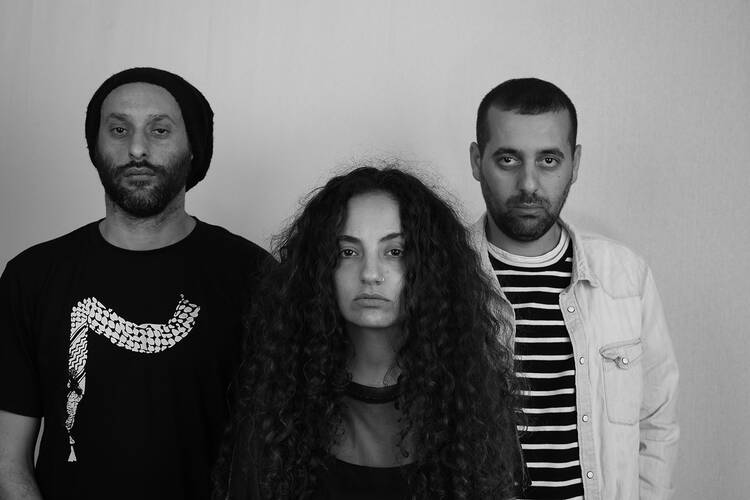When Maysa Daw was a teenager, she remembers going to a concert by DAM, which calls itself the first ever Palestinian hip-hop group, and asking herself: “Would I be able to sing with them someday?”
Now in her mid-20s, Ms. Daw has joined Tamer Nafar and Mahmood Jhere as a permanent member of DAM after several successful guest performances with them. Prior to joining the group, she established herself as a singer-songwriter in her hometown of Haifa, inspired by artists like Erykah Badu and Lauryn Hill.
The group has been going strong since the late ’90s and first made a name for itself with anthems in Arabic like “Meen Irhabi?” (“Who's the terrorist?”), which led to a profile at the time in Rolling Stone (France). Ms. Daw’s bandmate Nafar has been particularly outspoken on politics throughout his career and released a solo track (“Tamer Must Vote”) ahead of the Israeli elections in April urging Palestinian citizens of Israel to participate.
This year marks a new chapter for DAM, which released its third studio album on June 7. Although the once all-male band has included Ms. Daw, its youngest and only female member, for several years, the album showcases her talent—and their feminism—in a new way.
The album, almost exclusively in Arabic, has a relentless momentum, with songs that range from big, punchy tracks like “Prozac,” which seem made for an arena tour, to incisive, sparingly produced spoken-word songs like “Jasadik-Hom” (“Your Body”) that would be just as powerful whispered into your ear.
The band has fans beyond the Middle East, and recently performed at the BBC's Arabic Festival in London. DAM's listeners aren't only Arabic-speakers, either. In fact the producer of DAM's latest album, Itamar Ziegler, doesn't understand Arabic at all.
On “Jasadik-Hom,” DAM takes up feminism in a more straightforward and personal way than it has in the past (their 2015 single, “Who You R,” for example, similarly raps about the oppression of women, but its tone is more clever, the melody more pop than hip-hop). Ms. Daw says “Jasadik-Hom” is about how different layers of identity affect how you inhabit your body, in her case as an Arab, Palestinian woman living in Israel. “It took me time to learn how to be in love with my body/ My feminine Arab body/ Standing in front of the mirror, I took off my glasses because they are masculine-made,” she raps in Arabic.
She says the song was inspired by how Ta-Nehisi Coates’ talked about the experience of being black in the United States in Between the World and Me. Ms. Daw wrote the song in collaboration with her bandmates, and they wanted the song to convey her agency.
“When we talk about women's rights, a lot of times we ask for the permission of the men to give us our rights. Or to give us our equality,” she told America. “What is really powerful about [“Jasadik-Hom”] for me is that I come and say, ‘okay, I'm taking responsibility over my own freedom.’”
The song appears to have struck a chord with young Palestinian women, many of whom posted Instagram stories of themselves chanting the lyrics together into their phones following the song’s release on International Women’s Day this year.
But Ms. Daw says DAM is determined to make songs that are fun as well as serious. On the latest album, Ms. Daw also takes the lead in “Emta Njawzak Yamma” (“When Will You Get Married”), a catchy song in which DAM mocks the begging of their parents for them to settle down. “And in the meantime, I raise my glass in the name of being single,” she raps.
Ms. Daw says the song was important because it was allowed them to talk about an aspect of their lives that was not political in the way some of their other songs are. She explained that journalists—particularly in the West—sometimes do not even ask them about their music because they want to hear their opinions on politics.
“Yeah, every aspect of our life is connected somehow to politics,” she said. “But that's not all we have or all we are.”











It is is awesome to hear a group of singers male and female who are Islamic, Palestinian, and singing honestly about equality for women.
If we could just get Catholics to demand equality in the church, what a better world we would have. And yes "America Magazine" and Pope Francis - That has to include women ordained equally to men and starting with both priests and bishops! This will mean much more than just women have more leadership roles.